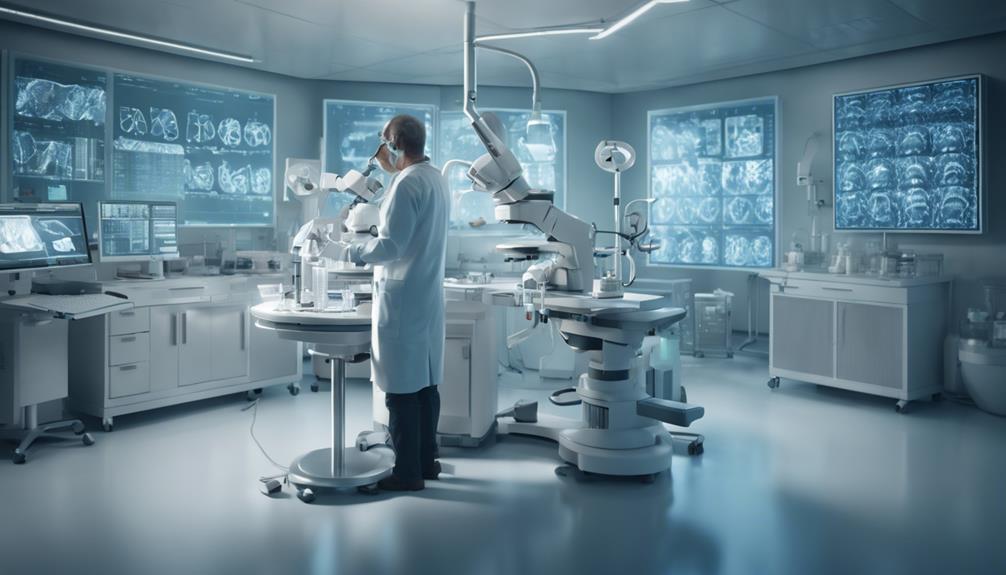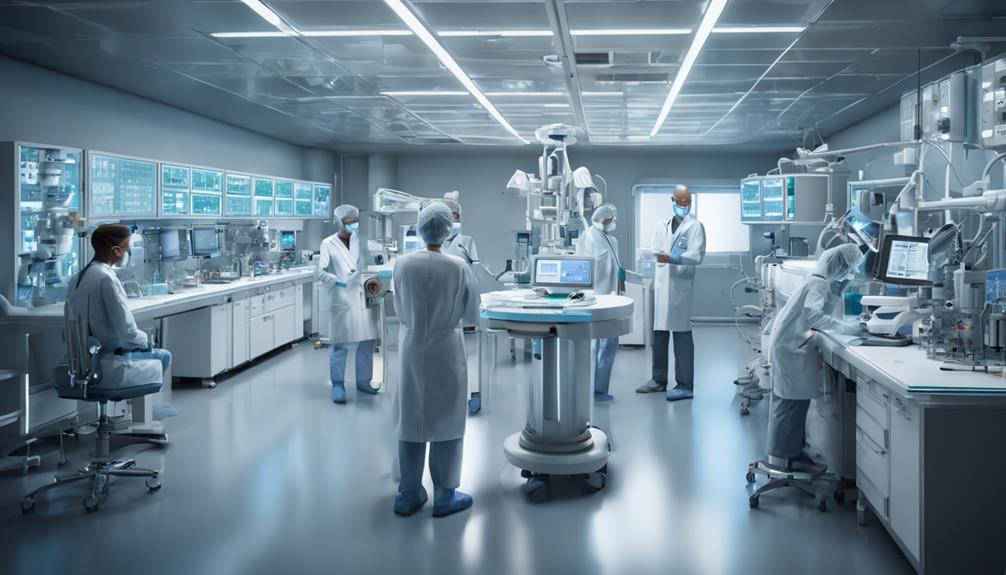
Choosing to become a medical technologist means you're stepping into a high-demand career where you'll play a crucial role in patient care. You'll enjoy job stability and a competitive salary while working in various healthcare settings, from hospitals to research labs. Your work in diagnosing and managing patient health through precise testing can significantly impact recovery rates and overall patient well-being. Additionally, you'll have endless opportunities for professional development and specialization, allowing you to stay on the cutting edge of medical technology. The deeper you explore this field, the more you'll discover its vast potential and personal rewards.
Essential Role in Healthcare

As a medical technologist, you play a crucial role in diagnosing and managing patient care. You're pivotal in analyzing bodily fluids and tissue samples, identifying abnormal cells or markers that are critical indicators of underlying health issues. Your expertise enables doctors to make accurate diagnoses and tailor treatments effectively, ensuring patient outcomes are optimized.
Your day-to-day responsibilities aren't just about handling specimens. You're also maintaining and calibrating sophisticated lab equipment, ensuring that every test result is accurate and reliable. Your ability to troubleshoot and solve technical issues in real-time keeps the lab running smoothly and prevents delays in patient care.
Moreover, your meticulous attention to detail and adherence to strict procedural protocols safeguard against contamination and errors, which are crucial in a field where even a small mistake can lead to significant consequences for patient health. Your documentation of results also supports a seamless flow of information, crucial for ongoing treatment strategies and specialist consultations.
In essence, your role extends beyond the technical execution of tests. You're a vital part of the healthcare team, impacting patient care profoundly and directly. This integral position within the medical field not only demands precision and expertise but also offers the profound satisfaction of making a real difference in people's lives.
Diverse Specialization Opportunities
Beyond your core responsibilities, you can explore a range of specializations that enhance your skill set and career opportunities in the field. As a medical technologist, you're not limited to general lab work; you can dive into areas like molecular biology, immunology, or clinical chemistry. Each specialty not only deepens your expertise but also opens new avenues for professional development.
You might find yourself drawn to microbiology, where you'll identify bacterial, viral, and fungal infections, or perhaps clinical chemistry is more your style, analyzing chemical and hormonal contents of body fluids. If technology fascinates you, consider specializing in medical biotechnology, where you can work on developing new medical tests and tools.
Don't overlook emerging fields like cytogenetics, where you'll analyze genetic data to understand diseases, or toxicology, where you study the effects of chemicals on the human body. These specializations allow you to become a key player in groundbreaking health research and patient care.
Each specialization not only broadens your knowledge but also tailors your career to match your interests and strengths. You're crafting a unique path that not only satisfies your curiosity but also significantly impacts patient care and medical advancements.
High Demand and Job Stability

The growing need for healthcare services ensures high demand and job stability for medical technologists. As populations age and medical advancements increase, you'll find your skills in constant need. This isn't just about hospitals; clinics, research labs, and private practices are all on the lookout for qualified techs like you.
You won't just be filling a position; you'll be stepping into a career where layoffs are rare and opportunities abound. It's a sector where job growth isn't just a possibility—it's expected. The Bureau of Labor Statistics projects a steady increase in employment opportunities for medical technologists over the next decade. This means you're not just choosing a job; you're securing your future.
Imagine a career where you're not constantly worrying about the next paycheck. Where you can settle in, grow, and maybe even pursue further specialties knowing there's a market eager for your expanded expertise.
Job stability isn't just comforting; it's empowering. It allows you to plan long-term, both professionally and personally, without the looming fear of unexpected job market shifts that affect many other sectors. As a medical technologist, you're stepping onto a path that's as stable as it's rewarding.
Competitive Salary and Benefits
You'll also benefit from a competitive salary and comprehensive benefits package as a medical technologist. This field not only offers financial stability but often includes perks that enhance your quality of life. Generally, salaries in this profession are significantly above average, reflecting the specialized skills and responsibilities that come with the job.
Most healthcare employers provide medical, dental, and vision insurance, ensuring you and potentially your family are covered. These benefits are crucial, considering the high cost of healthcare services. Additionally, you might find opportunities for bonuses or overtime pay, which can substantially increase your overall earnings.
Retirement plans such as 401(k) or 403(b), often with employer matching contributions, are common. This helps you secure a financially stable future without solely relying on social security. Life and disability insurance are other standard benefits, offering you peace of mind knowing you're protected against unforeseen circumstances.
Paid time off is another significant advantage. This includes not just vacation days but also sick leave and personal days, allowing you to rest and rejuvenate or take care of personal matters without financial penalty.
With such a robust package, stepping into this career can provide you with not just job satisfaction but also a secure financial future and comprehensive health coverage.
Continuous Learning and Advancement

While securing a stable financial future, consider that a career as a medical technologist also offers ample opportunities for professional growth through continuous learning and advancement. You'll find yourself at the heart of rapidly evolving medical sciences. Every day, you'll encounter new challenges and technologies that push you to expand your expertise and adapt quickly.
As a medical technologist, you're not just stuck in a lab; you're part of a dynamic field where continuous education is encouraged and often required. You'll need to stay updated on the latest laboratory techniques, understand new diagnostic tools, and sometimes even pursue additional certifications. This isn't just about keeping your job—it's about excelling in it.
Moreover, the path doesn't end at the lab bench. With experience and further education, you could move into roles like laboratory manager, clinical trials coordinator, or a specialist in a particular type of testing. These positions not only come with increased responsibility but also with a chance to influence more significant areas of the healthcare system.
You're in for a career where you won't just maintain your knowledge—you'll multiply it, ensuring you're always at the cutting edge of medical technology.
Positive Impact on Patient Care
As a medical technologist, your work directly enhances patient outcomes and healthcare efficiency. Every test you conduct contributes critical data that doctors use to make informed decisions. You're not just behind the scenes; you're at the heart of healthcare, ensuring that each patient receives a timely and accurate diagnosis. This can make the difference between early intervention and delayed treatment.
Your role also involves validating the reliability of test results. This rigorous process is vital because it ensures that treatments are based on precise information. You're the safeguard against errors that could potentially alter a patient's treatment plan. Imagine the relief a patient feels, knowing their diagnosis is backed by dependable data — that's the impact you have.
Moreover, your expertise helps to personalize patient care. By interpreting complex test outcomes, you assist in tailoring treatments that are specific to individual needs. This customization not only improves patient recovery rates but also minimizes unnecessary treatments that can cause stress and side effects.
You mightn't interact with patients daily, but your analytical skills and meticulous attention to detail are crucial in shaping their healthcare experiences. You're a key player in a team that champions optimal health outcomes.
Frequently Asked Questions
What Are the Common Myths About Being a Medical Technologist?
You might think medical technologists just run tests, but that's a myth. They're critical in diagnosing diseases, often using cutting-edge technology, and their work significantly impacts patient care and treatment outcomes.
How Do Medical Technologists Handle Work-Related Stress?
You'll manage work-related stress by employing relaxation techniques, maintaining a balanced lifestyle, and seeking support from colleagues. Prioritizing self-care is essential to cope effectively and stay productive in your demanding role.
What Are Typical Work Hours for a Medical Technologist?
As a medical technologist, you'll typically work standard 40-hour weeks, but these can include nights, weekends, and holidays due to the round-the-clock needs of healthcare facilities like hospitals and diagnostic labs.
How Does One Transition From Another Field to Medical Technology?
To switch fields, you'd typically start by pursuing relevant education, such as a degree in medical technology, and obtaining necessary certifications. Networking and gaining experience through internships can also significantly smooth your transition.
Are There Remote Work Opportunities in Medical Technology?
Yes, there are remote work opportunities in medical technology, especially in areas like data analysis, consulting, and tech support. You'll find that some roles allow telecommuting, offering flexibility in your work environment.
Conclusion
You're at the heart of healthcare as a medical technologist, playing a critical role in patient care. With diverse specialization opportunities, you'll never stop learning and advancing in your career.
The field offers not only job stability and competitive benefits but also the chance to make a real difference in people's lives. Embrace this rewarding career path, where every day you can impact health outcomes positively while enjoying the perks of a respected and stable profession.






